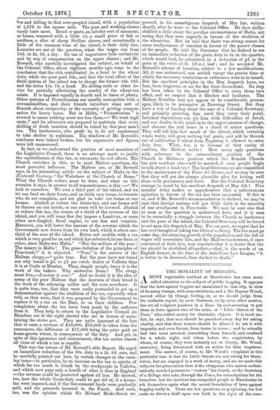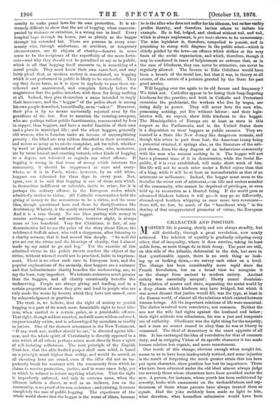THE MORALITY OF BEGGING.
AMOST regrettable incident at Manchester has once more called attention to the subject of public begging. It appears that the laws against beggars are maintained in that city, in view of its many tramps, with some strictness, and a Mr. Rayner Wood, moved either by Orange feeling, or, as we should judge from the verbatim report, by mere fussiness, or by some other motive, has set all religious passions in a flame by endeavouring to put them in force against two of the nuns, or "Little Sisters of the Poor," who collect money for charitable objects. It is most un- fair, he says, that men should be punished every day for asking charity, and that these women should be allowed to ask it with impunity and even favour, from house to house ; and he actually had two nuns arrested, committing them himself, and confined for a whole night, and taken before the magistrates, by whom, of course, they were instantly set at liberty, Mr. Wood, moreover, being threatened with an action for false imprison- ment. The answer, of course, to Mr. Wood's complaint in this
particular case is that the Little Sisters are not asking for them- selves, but are engaged in a work of mercy, and are no more fair subjects for prosecution than is the clergyman who moves ecclesi-
astically-minded persons to "restore" his church, or the Secretary of a Refuge who asks, through the Times, for subscriptions for the
homeless; but the incident has compelled people in Manchester to ask themselves again what the moral foundation of laws against begging really is. There are few questions so perplexing, for few
munity to make penal laws for its own protection. It is ex- tremely difficult to show that the act of begging, when unaccom- panied by violence or extortion, is a wrong one in itself. Every hospital begs through its boxes, just as plainly as the beggar through his extended hat. There are persons in every com- munity who, through misfortune, or accident, or temporary circumstances, are fit objects of charity—deserve in some sense to be the recipients of the superfluity of the more fortu- nate—and why they should not be permitted to say so in public, which is all that begging itself amounts to, is something of a moral puzzle. They must know their own cases best, and may fairly plead that, as modern society is constituted, no begging which is not performed in public is likely to be successful. They say they do no harm, as it is open to anybody to pass them un- relieved and unanswered, and complain bitterly before the magistrates that the police interfere with them for doing nothing at all Indeed, they give themselves a name intended to imply their innocence, and the " beggar " of the police-sheet is among his own people described, honorifically, as an " asker." Moreover, their plea is by no means universally rejected even by the guardians of the law. Not to mention the crossing-sweepers, who are perhaps rather public functionaries, remunerated by fees in copper, than beggars, and have a useful function of their own and a place in municipal life ; and the silent beggars, generally old women, who in London make an income of uncomplaining poverty ; the blind are very seldom disturbed in their avocation, and unless so noisy as to excite complaint, ask for relief, whether by word or placard, unhindered of the police, who, moreover, are by turns lenient and exacting towards other kinds of begging to a degree not tolerated as regards any other offence. If begging is wrong in that sense of wrong which interests the community, it should be suppressed at once and every- where, as it is in Paris, where, however, by an odd whim, beggars are tolerated for three days in every year. Nor, again, can it be said that begging is one of those acts which, in themselves indifferent or tolerable, incite to crime, for it is perhaps the solitary offence in the European codes which admittedly incites to virtue. All Catholic communities hold the giving of money to the necessitous to be a virtue, and the same idea, though questioned here and there by disciplinarians like Archbishop NV hately, is the nearly universal theory of Protestants. And it is a true theory. No one likes parting with money to receive nothing,—and self-sacrifice, however slight, is always more or less beneficial. Very few Christians, in fact, of any denomination fail to see the point of the story about Elwes, the celebrated Suffolk miser, who told a clergyman, after listening to a charity sermon, that it had moved him deeply. "So well did you set out the virtue and the blessings of charity, that I almost made up my mind to go and beg." Yet the exercise of this admitted virtue in the public streets renders the object of the virtue, without whom it could not be practised, liable to imprison- ment. There is no other such case in European laws, and the popular explanations of the anomaly, that beggars are a nuisance and that indiscriminate charity benefits the undeserving, are, to say the least, very imperfect. We tolerate nuisances much greater than the beggars, and all charity occasionally benefits the undeserving. People are always giving and lending, and in a certain proportion of cases they give and lend to people who are only made the worse by bounty which they have not earned, even by acknowledgment or gratitude.
The truth is, we believe, that the right of society to punish begging is a part of its much more formidable right to treat idle- ness, when carried to a certain point, as a punishable offence. That right, though seldom asserted, and still more seldom enforced, unquestionably exists, and is acknowleged by moralists as readily as jurists. One of the sternest utterances in the New Testament, "If any work not, neither should he eat," is directed againt idle- ness, and the whole spirit of Christianity is directly opposed to a vice which of all others perhaps arises most directly from a spirit of self-isolating selfishness. The root principle of the English Poor-law, that the able-bodied pauper shall earn relief, is based on a principle much higher than utility, and would be sound, as all elevating laws are sound, even if the idler did not so im- pudently break his contract with the community from which he claims to receive protection, justice, and in some cases help, yet to which he refuses to return anything whatever. That the right is imperfectly enforced, and only in extreme cases, when the idleness inflicts a direct, as well as an indirect, loss on the community, is no proof of its non-existence ; and existing, it covers completely the ewe of public begging. The experience of the whole world shows that the beggar is the worst of idlers, because
he is the idler-who does not suffer for his idleness, but rather visibly profits thereby, and therefore incites others to imitate his example. Re is fed, lodged, and clothed without toil, and toil, which is always unpleasant, is pro taut° shown to be unnecessary. The wise legislator is, therefore, compelled to punish, and in punishing to stamp with disgrace in the public mind—which is chiefly guided by the laws—an offence which strikes at the very basis of the social organisation, and which, therefore, though it may be condoned in cases of helplessness so extreme that, as in the case of blindness, they can never be attractive, can never be regularly allowed. The licence to Edie Ochiltree would have been a breach of the social law, but that it was, in theory at all events, of the nature of a pension granted by the State for past good service.
Will begging ever rise again to its old favour and frequency ? We think not. Catholics appear to be losing their long-lingering kindness for the practice, and both in Catholic and Protestant countries the proletariat, the workers who live by wages, are rising daily to power. They will never love the men who, possessing nothing, yet live without labour ; and their legis- latures will we expect, show little kindness to the beggar. The Municipalities of Europe are at least as stern in this respect as the Parliaments, and in the •-United States there is a disposition to treat beggars as public enemies. They are hunted in a State like New Jersey like dangerous animals, and though this arises in part from fear, the American tramp being a potential criminal, it springs also, as the literature of the sub- ject shows, from the deep disgust of an industrious community with the man who returns nothing to it. The beggar will not have a pleasant time of it in .democracies, while the Social Re- public, if it is ever established, will make short work of him. His life will not be much safer under a Bebel regime than that of a king, while it will be at least as uncomfortable as that of an aristocrat or millionaire. Indeed, the beggar must seem to the Socialist the worst sort of aristocrat,—an idle and useless member of the community, who cannot be deprived of privileges, or even held up to execration as a bloated being. If the world goes as advanced thinkers believe it will go—it may go so differently, almond-eyed heathen whipping us once more into reverence— there will, we fear, be much of the "beneficent whip" in the destiny of that unappreciated promoter of virtue, the European beggar.



































 Previous page
Previous page